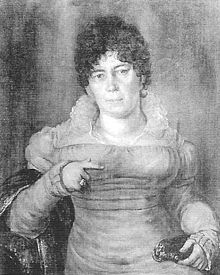Anna Maria Rüttimann-Meyer from Schauensee

Anna Maria Rüttimann-Meyer von Schauensee (born October 6, 1772 in Lucerne ; † August 19, 1856 ibid) comes from the Lucerne patrician family of the same name and was an enlightened republican and influential salonnière . She was the wife of Vinzenz Rüttimann and the pen pal of Paul Usteri .
family
Anna Maria Meyer was the daughter of the councilor Franz Rudolf Theoderich Meyer von Schauensee and Maria Waldburga von Fleckenstein. Her brother Franz Bernhard Meyer von Schauensee became one of the most influential Swiss politicians of his time and was Minister of Police and Justice during the Helvetic Republic. In 1794 she married Vinzenz Rüttimann , with whom she had eight children. The Rüttimann family was the last to be accepted into the ruling patriciate circle before the Fundamental Law of 1773. While her husband was pursuing a political career, Anna Maria Rüttimann took care of the home and raised her children according to the upbringing maxims of the famous enlightener Jean-Jacques Rousseau .
politics
Anna Maria Rüttimann regularly invited guests to her home or took part in literary and cultural events outside of the city in order to debate current educational pamphlets and political changes. In 1799 she met the publicist and publisher Paul Usteri , with whom she had a pen friendship for many years. Paul Usteri always asked Anna Maria Rüttimann for advice on political and moral matters. He sent her information on the latest political developments in Helveticia and was interested in her opinion. Not only with Paul Usteri, but also with her husband Vinzenz Rüttimann, friend Melchior Mohr and brother Franz Bernhard Meyer von Schauensee, she was in demand as an adviser and mediator. However, Rüttimann chose not his wife for his glamorous state receptions, for which he was famous, but Sophie Schumacher-Dürler, the mother of the future General Felix von Schumacher , as the beaming hostess .
Her political opinion can be read from a letter to Paul Usteri:
«[…] Mais je vous demande qu'est le peuple! Et qu'est sa declaration! Le peuple par lui même ne peut et ne doit rien vouloir, la nature ne la pas mis en même pour savoir ce qui lui est bon, et sa déclaration n'est jamais autre chose que la voix d'un factieux […]. Ce n'est donc que la voix des hommes les plus impartieaux et des plus éclairés qui doivent former la volonté du peuple! […] Restant donc du principe que le gouvernement est composé des hommes superieurs en expériences et en vertus et il doit veritablement sentir sa superiorité et agir en consequence […]. »
In their eyes, not all citizens were (yet) mature enough to take part in political decision-making processes.
With her elitist views, the Lucerne woman was in good company with her friend Paul Usteri. This was a passionate constitutional fighter. He tried to ensure that the people only had the right to designate the eligible candidates. The elections themselves should be reserved for a qualified elite. Thus she belonged to a small group of young aristocratic Enlightenmentists who tried to implement their ideals of a representative republic during the Helvetic Republic. Her husband, Vinzenz Rüttimann, carried out the coup in 1814 , with which Lucerne restored the old patrician constitution.
literature
- Evelyn Boesch: "The most pleasant thing is to think of our republic". Anna Maria Rüttimann on the relationship between state and gender in Helvetic Republic . In: Andreas Ernst u. a. (Ed.): Revolution and Innovation. The conflict-ridden creation of the Swiss federal state in 1848 . Zurich 1998, pp. 161–172.
- Evelyn Boesch: "I will soon no longer know how I want to sit in my room". What Helvetic politics meant for the patrician Anna Maria Rüttimann . In: Verein Frauenstadtrundgang (Ed.): With pepper and whistle . Lucerne 1998, pp. 46–59.
- Evelyn Boesch: With conviction and dedication. Republican women and men experience the Helvetic Republic . In: Brigitte Baur u. a. (Ed.): «What a life». Source texts on the social upheaval in central Switzerland after 1798 . Zurich 1998, pp. 47–108.
- Esther Nünlist: The H elvetic Revolution and "Woman Instinct". The political influence of the Republican Anna Maria Rüttimann . Saarbrücken 2010, ISBN 978-3-639-29596-2 .
Individual evidence
- ↑ Date of birth and death according to Hans Dommann: Vinzenz Rüttimann, a Lucerne statesman (1769–1844) . Stans 1923.
- ^ Felix von Schumacher: Luisa . Lucerne 1983.
- ^ Esther Nünlist: Helvetic Revolution and "Women Instinct". The political influence of the Republican Anna Maria Rüttimann . Saarbrücken 2010, p. 3.
| personal data | |
|---|---|
| SURNAME | Rüttimann-Meyer von Schauensee, Anna Maria |
| BRIEF DESCRIPTION | Swiss Republican and Salonnière |
| DATE OF BIRTH | October 6, 1772 |
| PLACE OF BIRTH | Lucerne |
| DATE OF DEATH | August 19, 1856 |
| Place of death | Lucerne |